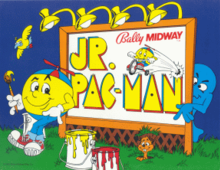| Revision as of 14:51, 11 January 2023 editDgpop (talk | contribs)Extended confirmed users54,796 edits →top: more specific link + more on gameplay← Previous edit | Revision as of 16:47, 31 May 2023 edit undoDgpop (talk | contribs)Extended confirmed users54,796 edits infobox tweaksNext edit → | ||
| Line 6: | Line 6: | ||
| | image = Jr pac flyer.png | | image = Jr pac flyer.png | ||
| | caption = Arcade flyer | | caption = Arcade flyer | ||
| |released = '''Arcade'''{{vgrelease|NA|August 13, 1983}}'''Atari 2600'''{{vgrelease|NA|1986}}'''MS-DOS'''{{vgrelease|NA|1988}}''' |
|released = '''Arcade'''{{vgrelease|NA|August 13, 1983}}'''Atari 2600'''{{vgrelease|NA|1986}}'''MS-DOS'''{{vgrelease|NA|1988}}'''C64'''{{vgrelease|WW|1988}} | ||
| | genre = ] | | genre = ] | ||
| | modes = |
| modes = 1-2 players alternating turns | ||
| | arcade system = ] | | arcade system = ] | ||
| |series = '']'' | |series = '']'' | ||
Revision as of 16:47, 31 May 2023
| This article needs additional citations for verification. Please help improve this article by adding citations to reliable sources. Unsourced material may be challenged and removed. Find sources: "Jr. Pac-Man" – news · newspapers · books · scholar · JSTOR (July 2019) (Learn how and when to remove this message) |
| Jr. Pac-Man | |
|---|---|
 Arcade flyer Arcade flyer | |
| Developer(s) | General Computer Corporation |
| Publisher(s) | |
| Series | Pac-Man |
| Platform(s) | Arcade, Atari 2600, Commodore 64, MS-DOS |
| Release | Arcade
|
| Genre(s) | Maze |
| Mode(s) | 1-2 players alternating turns |
| Arcade system | Namco Pac-Man |
Jr. Pac-Man is an arcade video game developed by General Computer Corporation and released by Bally Midway on August 13, 1983. It has the same gameplay as prior entries in the series, but the maze in Jr. Pac-Man scrolls horizontally and has no escape tunnels. The bonus item which moves around the maze changes dots into a form which slows Jr. Pac-Man as they are being eaten.
Gameplay

The core gameplay of Jr. Pac-Man is similar to its predecessors. The player controls the eponymous Jr. Pac-Man (who wears an animated propeller beanie), and scores points by eating all of the dots in the maze, while four ghosts (Blinky, Pinky, Inky, and Tim) chase him around the maze and attempt to catch him. Eating a power pellet turns the ghosts blue, briefly allowing the player to eat them for extra points. Once the maze is cleared, a new maze is presented and the gameplay continues.
The mazes are now two times the width of the monitor and scroll horizontally. A total of seven mazes appear throughout the game, and five of them have six power pellets instead of four, but none of them have tunnels that wrap around from one side of the screen to the other.
Bonus items (such as tricycles, kites, and balloons) appear in each round, starting above the ghosts' lair and moving around the maze as in Ms. Pac-Man. As an item encounters dots, it changes them into larger dots that are worth 50 points instead of 10, but they also slow Jr. Pac-Man down more than regular dots. If an item has been out for long enough and encounters a power pellet, it self-destructs, taking the power pellet with it. When Jr. Pac-Man gets caught by a ghost, the larger dots disappear; if there are only a few left, they revert to their original size.
The between-level intermissions show the developing relationship between Jr. Pac-Man and a small red ghost named Yum-Yum who is apparently the daughter of Blinky.
Ports
An Atari 2600 version developed by General Computer Corporation (the designers of the arcade version) was released by Atari Corporation in 1986 with mazes that scroll vertically rather than horizontally, but is otherwise a faithful adaptation. Jr. Pac-Man was later ported to the Commodore 64 and IBM PC compatibles.
Ports for the Atari 5200 and the Atari 8-bit family were finished in 1984, but were scrapped along with Super Pac-Man when the home divisions of Atari, Inc. were sold to Jack Tramiel.
An unofficial port for the Atari 7800 was published in 2009 by AtariAge.
References
- "The MIT Dropouts Who Created Ms. Pac-Man: A 35th-Anniversary Oral History". 3 February 2017. Archived from the original on 15 June 2018. Retrieved 12 January 2022.
- Jr. Pac-Man at Lemon 64
- Reichert, Matt. "Jr. Pac-Man (Atari 5200)". AtariProtos.com. Archived from the original on 2011-04-29. Retrieved 2011-03-05.
- Reichert, Matt. "Jr. Pac-Man (Atari 8-bit)". AtariProtos.com. Archived from the original on 2011-07-07. Retrieved 2011-03-05.
External links
- Jr. Pac-Man at the Killer List of Videogames
- Jr. Pac-Man at the Arcade History database
- Jr. Pac-Man for the Atari 2600 at Atari Mania
- Jr. Pac-Man at Lemon 64
- ClassicGaming.com entry on Jr. Pac-Man with screenshots of all the mazes and cutscenes
| Pac-Man | |||||
|---|---|---|---|---|---|
| Video games | |||||
| Other media | |||||
| Companies | |||||
| Characters | |||||
| Related |
| ||||